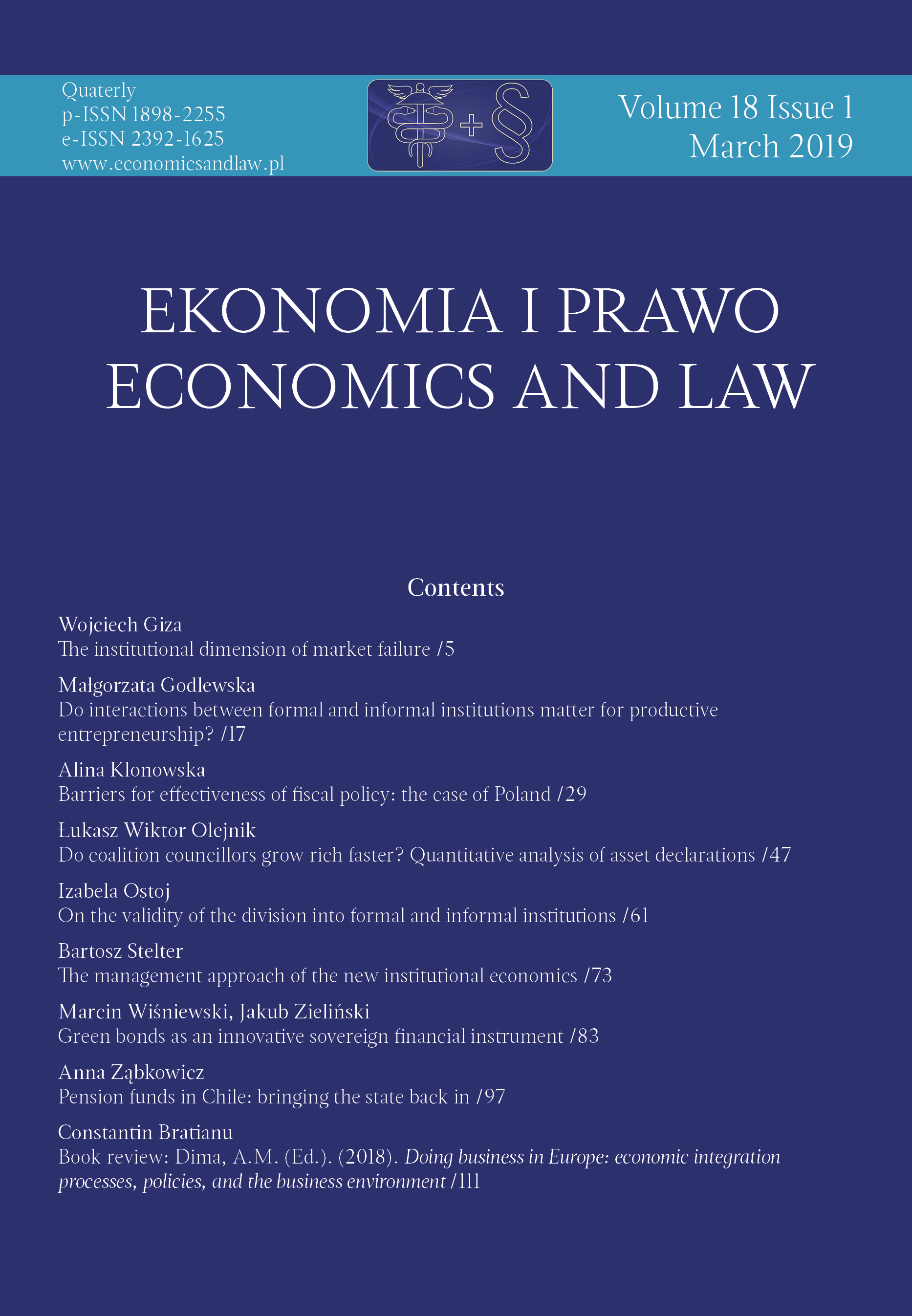On the validity of the division into formal and informal institutions
DOI:
https://doi.org/10.12775/EiP.2019.005Keywords
nstitutions, formal institutions, informal institutions, legal originAbstract
Motivation: Definitions and classifications constitute the most important elements of each theory. The division of institutions into formal and informal is commonly applied within new institutional economics. In his papers devoted to institution measurement S. Voigt developed the division of institutions into internal and external, argued its functionality and, to a certain extent, its superiority.
Aim: The aim of this paper is to investigate and assess the validity and applicability of the division of institutions into formal and informal from the perspective of the analysis of social and economic phenomena.
Results: Based on literature, as well as drawing on the origins of the institution classification and referenced examples, it was proved that the division into formal and informal institutions is not only at least equally precise as other classifications, but it is also consistent and logical, which determines its high usefulness in scientific research.
References
Blaug, M. (1985). Economic theory in retrospect. Cambridge–New York–Port Chester–Melbourne–Sydney: Cambridge University Press.
Cole, D. (2017). Laws, norms and the institutional analysis and development framework. Journal of Institutional Economics, 13(4). doi:10.1017/S1744137417000030.
Furubotn, E.G., & Richter, R. (1998). Institutions and economic theory. Michi-gan: The University of Michigan Press.
Gregory, P., & Stuart, R. (2004). Comparing economic systems in the twenty-first century. Boston: Houghton Miffin.
Greif, A., & Mokyr, J. (2017). Cognitive rules, institutions, and economic growth: Douglas North and beyond. Journal of Institutional Economics, 13(1). doi:10.1017/S1744137416000370.
Harris-White, B. (2017). Rethinking institutions: innovation and institutional change in India’s informal economy. Modern Asian Studies, 51(6). doi:10.1017/S0026749X16000603.
Hayek, A.F. (1989). Wielka utopia. Wolność ekonomiczna i rząd reprezentatywny. Lublin–Warszawa: Antyk.
Hayek, A.F. (1998). Law, legislation and liberty. Volume 1: Rules an order. London: Routlege.
Hicks, J.R. (1969). The theory of economic history. New York: Oxford Universi-ty Press.
Hodgson, G.M. (2006). What are institutions? Journal of Economic Issues, 40(1). doi:10.1080/00213624.2006.11506879.
Hodgson, G.M. (2015). On defining institutions: rules versus equilibria. Jour-nal of Institutional Economics, 11(3). doi:10.1017/S1744137415000028.
Johnson, P., Brookes, M., Wood, G., & Brewster, C. (2017). Legal origin and social solidarity: the continued relevance of Durkheim to comparative in-stitutional analysis. Sociology, 51(3). doi:10.1177/0038038515611049.
Karacuka, M. (2018). Religion and economic development in history: institu-tions and the role of religious networks. Journal of Economic Issues, 52(1). doi:10.1080/00213624.2018.1430941.
Kasper, W. (2002). Economic freedom & development: an essay about property rights, competition, and prosperity. New Delhi: Centre for Civil Society.
Madden, E. (1963). Ernst Nagel’s structure of science. Philosophy of Science, 30(1). doi:10.1086/287914.
Marcesse, T. (2018). Public policy reform and informal institutions: the politi-cal articulation of the demand for work in rural India. World development, 103. doi:10.1016/j.worlddev.2017.10.024.
Meon, P.G., & Sekkat, K. (2015). The formal and informal institutional framework of capital accumulation. Journal of Comparative Economics, 43(3). doi:10.1016/j.jce.2014.07.001.
Mormann, T. (2008). The structure of scientific theories in logical empiri-cism. In A. Richardson & T. Uebel (Eds.), The Cambridge companion to logi-cal empiricism. Cambridge: Cambridge University Press. doi:10.1017/CCOL0521791782.007.
Nagel, E., (1961). The structure of science. Problem in the logic: of science explana-tion. London: Routledge & Kegan Paul.
Naraparaju, K. (2016). Impediments to contract enforcement in day labour markets: a perspective from India. Journal of Institutional Economics, 12(3). doi:10.1017/S1744137415000442.
North, D.C. (1992). Transactions costs, institutions, and economic performance. San Francisco: ICS Press.
North, D.C. (2005). Understanding the process of economic change. Princeton: Princeton University Press.
Osei-Tutu, P. (2017). Taboos as informal institutions of local resource man-agement in Ghana: why they are complied with or not. Forest Policy and Economics, 85. doi:10.1016/j.forpol.2017.09.009.
Ostrom, E., & Basurto, X. (2010). Crafting analytical tools to study institu-tional change. Journal of Institutional Economics, 7(3). doi:10.1017/S1744137410000305.
Pejovich, S. (2008). Law, informal rules and economic performance: the case of common law. Cheltenham: Edward Elgar Publishing.
Redmond, W.H. (2008). Formal institutions in historical perspective. Journal of Economic Issues, 42(2). doi:10.1080/00213624.2008.11507167.
Robinson, J.A. (2013). Measuring institutions in the Tobriand Islands: a com-ment of Voigt’s paper. Journal of Institutional Economics, 9(1). doi:10.1017/S1744137412000215.
Seidler, V. (2018). Coping informal institutions: the role of British colonial officers during the decolonization of British Africa. Journal of Institutional Economics, 14(2). doi:10.1017/S1744137417000443.
Shirley, M. M. (2013). Measuring institutions: how to be precise though vague. Journal of Institutional Economics, 9(1). doi:10.1017/S1744137412000227.
Takizawa, H. (2017). Masahiko Aoki’s conception of institutions. Evolutionary Institutional Economic Review, 14(2). doi:10.1007/s40844-017-0087-0.
Voigt, S. (2011). Empirical constitutional economics: onward and upward? Journal of Economic Behavior & Organization, 80(2). doi:10.1016/j.jebo.2011.06.024.
Voigt, S. (2012). How to measure the rule of law? Kyklos, 65(2). doi:10.1111/j.1467-6435.2012.00538.x.
Voigt, S. (2013a). How (not) to measure institutions. Journal of Institutional Economics, 9(1). doi:10.1017/S1744137412000148.
Voigt, S. (2013b). How (not) to measure institutions: a replay to Robinson and Shirley. Journal of Institutional Economics, 9(1). doi:10.1017/S1744137412000240.
Voigt, S. (2018). How to measure informal institutions. Journal of Institutional Economics, 14(1). doi:10.1017/S1744137417000248.
Williamson, C.R. (2009). Informal institutions rule: institutional arrange-ments and economic performance. Public Choice, 139(3–4). doi:10.1007/s11127-009-9399-x.
Downloads
Published
How to Cite
Issue
Section
Stats
Number of views and downloads: 886
Number of citations: 0
